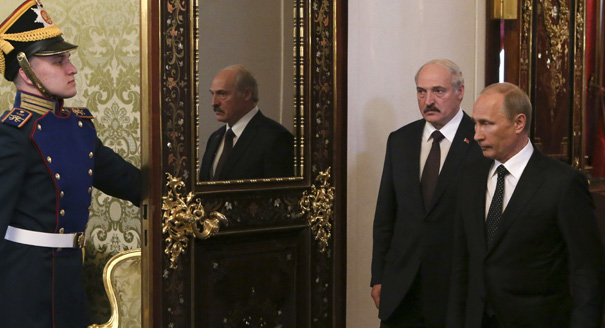European ministers and officials have stated on many occasions that the crisis in Ukraine requires the EU to strengthen its commitment, not just to that benighted country, but to the whole Eastern Partnership region. If this is the case, Belarus presents a particular challenge.
EU-Belarus relations have been largely frozen for two years. A debate is now taking shape on whether the new geostrategic context across the Eastern Partnership might unblock this atrophy.
The events in Ukraine have impacted domestic political developments in Belarus. Recent polls reveal that public support for the Belarusian president, Alexander Lukashenko—which had been declining since the country’s economy started deteriorating in 2011—has increased by nearly 10 percent since the eruption of protests in Ukraine. The bloodshed in Maidan has prompted many Belarusians to look more favorably on a strong hand and political stability. Although sociologists predict that this hike in pro-regime support will not last long, it has already curtailed the behavior of the political opposition.
Opposition groups are now renouncing public protests, especially those that had been expected to take place during the 2015 presidential election campaign. Their motivation is twofold. First, as new political protests are expected to be violently dispersed, the opposition thinks that they will only further weaken its ranks. Second, protests could further undermine the opposition’s public image, as polls also suggest that nearly 70 percent of Belarusians oppose a Maidan-like transition. Such a dramatic shift in opposition thinking leaves Belarus with almost no prospect of regime change in the near future.However unlikely it might look, the possibility of Russian military intervention in Belarus has become a worry for Lukashenko’s government. Minsk has intensified contacts with EU and member states officials in recent months, to avoid placing all of its geostrategic eggs in one basket.
Yet as the sands shift, the Ukraine crisis has not yet had a dramatic impact on the EU’s strategic calculations in Belarus.
Indeed, diplomats in Minsk urge modesty of ambition. Russia’s control of Belarus has strengthened, particularly in the security field. The EU cannot come close to competing with such influence. Russia will continue to be the prime player; the EU can at best chisel away at the margins to fashion different rules of the game in the way that Belarus operates.
Several EU member states have argued that the Ukraine crisis speaks in favor of enhanced engagement with Belarus. Some are now more inclined to see Lukashenko as the defender of Belarusian independence against Russia.
But far-reaching changes are unlikely. The EU offered rapprochement in 2008-2009. The president pocketed support from Europe and the IMF, failed to implement reforms, and used the West's engagement primarily to gain stronger influence over Moscow. He then clamped down brutally hard in the 2010 elections. This experience has diluted Europe’s enthusiasm for a new post-Crimea rapprochement. And while the Crimea annexation has made Lukashenko nervous, EU officials doubt the genuineness of his stated desire for a properly balanced multi-vector foreign policy.
Some member states have urged that EU political conditionality be slightly diluted. The EU may also reduce the number of entities (individuals and organizations) included on the current sanctions list. But there remains a consensus that the EU demand to have political prisoners freed should not be completely dropped.
At a more modest technical level, some elements of cooperation are gaining traction. The regime has just re-engaged in a (diluted and more informal) European dialogue on modernization. Visa facilitation talks are proceeding, albeit slowly. The regime has requested EU initiatives on standards-harmonization in food safety, penitentiary management, and energy efficiency. Largely unnoticed, EU funding has flowed to Belarus under the TAIEX technical exchange programme and a local authorities initiative—these are low-key political instruments but they do provide for potentially valuable avenues of constructive engagement in a country where few exist.
None of this is dramatic or of high significance. It reflects a cautious, agenda of the EU seeking gently to reshape governance norms over the long term. The Ukraine crisis has not jolted relations into a higher gear. Indeed, Belarus’ signing of the Eurasian Union accord at the end of May 2014 raises new difficulties for the slowly accumulating range of technical cooperation.
If the EU has any potential for a distinctive engagement in Belarus it must be with emerging civil society actors. Yet this where domestic structures render engagement most problematic; even as the regime seeks to diversify its external links, European diplomats in Minsk admit that they increasingly struggle to locate the access points for influence that Western governments and international institutions work through in other countries.
The only moderately promising way ahead is for the EU to focus on reaching out to as wide a range of society as possible, going beyond the provision of financial support to overtly political groups or highly professionalized civil society organizations. For a comprehensive engagement with the people of Belarus, the EU needs to expand its presence and activities in the country and conduct a multi-level public relations campaign, first aimed at educational establishments and in the media.
In Belarus, a focus on long-term governance and rights values offers the EU its only meaningful counterpoint to complete Russian primacy.
And it is precisely here where the Ukraine crisis might have an effect. Bearing in mind the commitment by Ukraine’s new president, Petro Poroshenko, to the European course and his readiness to critically engage with Belarus in this regard, Ukraine may offer the EU a helping hand.
Lukashenko likes what he considers Poroshenko’s pragmatism and might be open to such cooperation. This opens the door to the kind of triangular cooperation that was supposed to be at the heart of the Eastern Partnership but that has never gained traction. It might just widen the scope of engagement beyond what for now looks like an intractably limited set of EU tactical options.
Yekaterina Glod is Robert Bosch Academy Fellow, Chatham House.








.jpg)